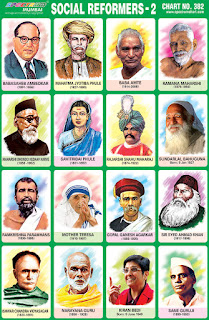 |
| Social Reformers 2 Chart |
Spectrum Chart - 382 : Social Reformers 2
1. Babasaheb Ambedkar - Babasaheb Ambedkar
was an Indian jurist, economist, politician and social reformer who
inspired the campaigned against social discrimination against
Untouchables (Dalits). He was Independent India's first law minister
and the principal architect of the Constitution of India.
2. Mahatma Jyotiba Phule - Jyotirao
Govindrao Phule was an Indian activist, thinker, social reformer and
writer from Maharashtra. He is most known for his efforts to educate
women and the lower castes as well as the masses. After educating his
wife, he opened the first school for girls in India in August 1848.
3. Baba Amte - Murlidhar Devidas Amte,
popularly known as Baba Amte was an Indian social worker and social
activist known particularly for his work for the rehabilitation and
empowerment of poor people suffering from leprosy. Amte also used
Gandhian principles to fight against corruption, mismanagement and
poor, shortsighted planning in the government. Thus, he used
non-violent means to fight the Indian government in the fight of
independence.
4. Ramana Maharshi - Ramana Maharshi was
an Indian sage and jivanmukta. Ramana Maharshi gave his approval to a
variety of paths and practices, but recommended self-enquiry as the
principal means to remove ignorance and abide in Self-awareness,
together with bhakti (devotion) or surrender to the Self.
5. Maharshi Dhondo Keshav Karve - Dr.
Dhondo Keshav Karve popularly known as Maharishi Karve, was a social
reformer in India in the field of women's welfare. Karve worked for
promoting widows' education. The Government of India awarded him its
highest civilian award, the Bharat Ratna, in 1958.
6. Savitribai Phule - Savitribai Phule was
an Indian social reformer and poet. She played an important role in
improving women's rights in India during British rule. She along with
her husband Jyotirao Phule founded the first women's school at Bhide
Wada in Pune in 1848. She also worked to abolish discrimination and
unfair treatment of people based on caste and gender. She is regarded
as an important figure of the Social Reform Movement in Maharashtra
and is regarded as "Rashtramata" - The Mother of The
Nation.
7. Rajarshi Shahu Maharaj - Chhatrapati
Shahu Maharaj of the Bhonsle dynasty, was the Raja 1894-1900 and
first Maharaja (1900-1922) of the Indian princely state of Kolhapur.
Shahu Maharaj is credited with doing much to further the lot of the
lower castes. He did much to make education and employment available
to all. He provided free education to all and also opened several
hostels in Kolhapur thereby facilitating the education of the rural
and low-caste indigent.
8. Sundarlal Bahuguna - Sunderlal Bahuguna
is a noted Garhwali environmentalist, Chipko movement leader and a
follower of Mahatma Gandhi's philosophy of Non-violence and
Satyagraha. For years he has been fighting for the preservation of
forests in the Himalayas, first as a member of the Chipko movement in
the 1970s and later spearheaded the Anti-Tehri Dam movement. He was
one of the early environmentalists of India.
9. Ramkrishna Paramhans - Swami
Ramakrishna Paramahamsa was an Indian mystic and yogi during the
19th-century. He provided spiritual enlightenment to the people of
Bengal and played a key role in the social reform movement in Bengal
in 19th century.
10. Mother Teresa - Mother Teresa was one
of the great servants of humanity. She was an Albanian Catholic nun
who came to India and founded the Missionaries of Charity in Kolkata.
Her selfless work among the poverty-stricken people of Kolkata is an
inspiration for people all over the world and she was honored with
Nobel Prize for her work.
11. Gopal Ganesh Agarkar - Gopal Ganesh
Agarkar was a Chitpavan Brahminsocial reformer, educationist, thinker
from Maharashtra, India during the British rule. He was a co-founder
of the renowned educational institutes like the New English School
etc. He was the first editor of the weekly Kesari and founder and
editor of periodical Sudhaarak. In his public life of just about 15
years, Agarkar made gigantic contributions to the field of social
reforms and education and left an indellible mark on the social life
of Maharashtra.
12. Sir Syed Ahmad Khan – Sir Syed Ahmed
Khan was a teacher and politician. He was also a social reformer. He
founded the school that would later become Aligarh Muslim University.
Sir Syed Ahmed Khan played a vital role in improving the Muslim
status. He brought the Muslim revival through the Aligarh movement
and showed the importance of education.
13. Ishwar Chandra Vidyasagar - Ishwar
Chandra Vidyasagar was an Indian Bengali polymath and a key figure of
the Bengal Renaissance. He was a philosopher, academic educator,
writer, translator, printer, publisher, entrepreneur, reformer and
philanthropist. His efforts to simplify and modernize Bengali prose
were significant.
14. Narayana Guru - Narayana Guru was a
social reformer of India. He led a reform movement in Kerala,
rejected casteism and promoted new values of spiritual freedom and
social equality. He stressed the need for the spiritual and social
uplift of the downtrodden by their own efforts through the
establishment of temples and educational institutions. In the
process, he denounced the superstitions that clouded the fundamental
Hindu cultural convention of caste.
15. Kiran Bedi - Kiran Bedi is a retired
Indian Police Service officer, social activist, former tennis player
and politician who is the current Lieutenant Governor of Puducherry.
She is the first woman to join the Indian Police Service(IPS) in
1972. She remained in service for 35 years.
16. Sane Guruji - Pandurang Sadashiv Sane
also known as Sane Guruji by his students and followers, was a
Marathi author, teacher, social activist and freedom fighter from
Maharashtra, India. He is referred to as the National Teacher of
India.

No comments:
Post a Comment